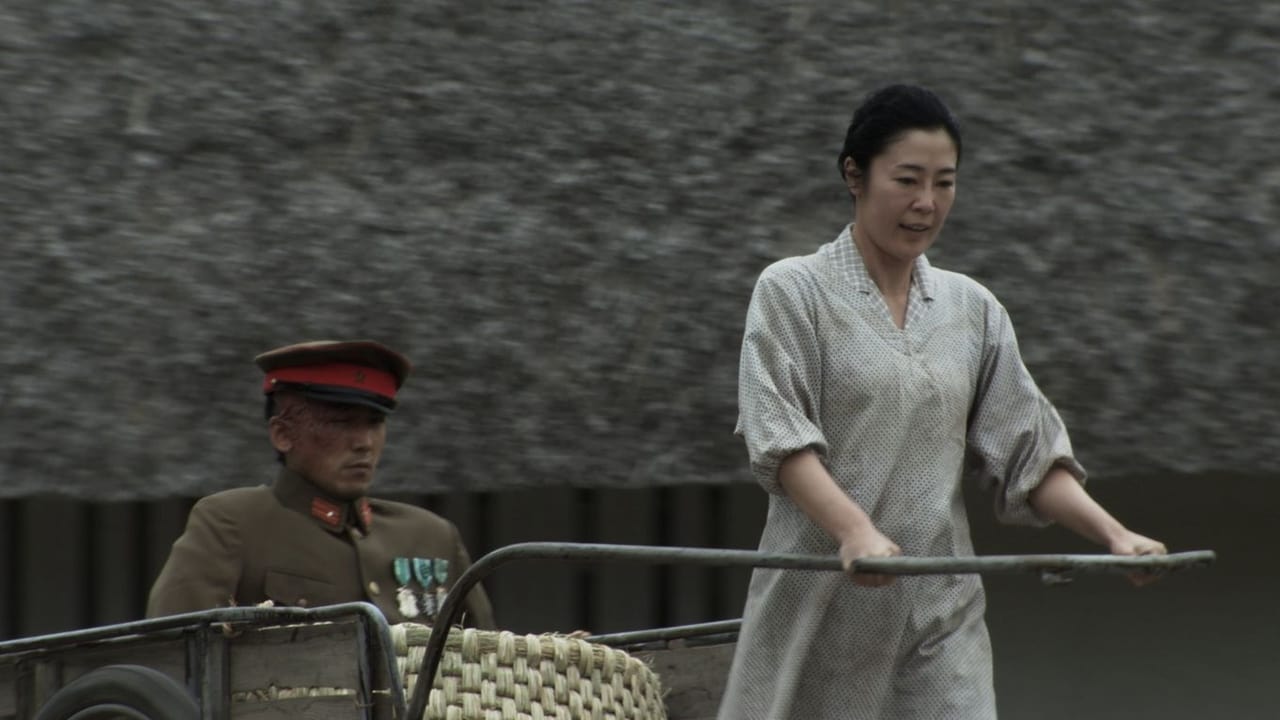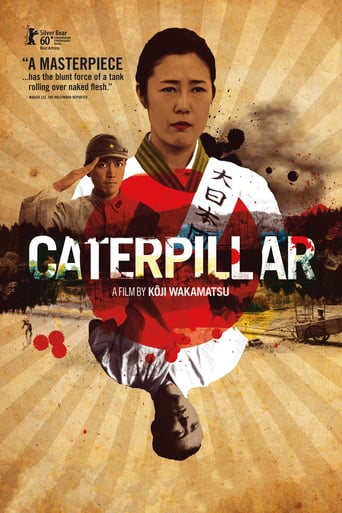

disgusting, overrated, pointless
... View MoreWatch something else. There are very few redeeming qualities to this film.
... View MoreI have absolutely never seen anything like this movie before. You have to see this movie.
... View MoreClose shines in drama with strong language, adult themes.
... View MoreThe film is full of flashbacks, and one of the early ones was of Kyuzo and all the village dressing up for his departure from the village into the military.Most of the film takes place after Kyuzo is a veteran of the war between China and Japan around the time of World War II. He lost both legs and both arms in combat, his head is about 40% burned, and he is deaf. His speech is adversely affected by the lack of hearing.His wife Shigeko is horrified with this from the start. She tries to strangle him, but does not have the strength. The villagers honor Kyuzo and his achievements, such as they were, in China. They encourage Shigeko strongly to take care of the hero, the War God.Shigeko learns to deal with his eating, waste, bathing, and sexual functions. She takes care of him, which is an large daily effort, an enormous effort over an interval of years. She also works in the rice fields with the other villagers during the day.He tries to learn to write/draw with his mouth and pencil, starting with 'I want to do it.'She parades him around the village dress in uniform and medals. Sometimes she leaves him in the cart to watch her work in the rice fields.About half way through the film, she really gets into being the put-upon wife, and insists on his performing his responsibilities as well. She gets lots of attention for this, and he gets a taste of all the work (done by others) that he generates. Also, she becomes very conscious of the fact that he can no longer beat her. After some time in this steady state, Kyuzo starts having bad memories of what he did in China. Plus his obligations as War God never seem to go away.By 1945, the war started to come to Japanese soil. The radio in Japan reports something entirely different. Shigeko starts getting inwardly discouraged with the horrible things that have happened. Kyuzo has more flashbacks of his bad deeds in China.Toward the end of the war, she needs satisfaction, but he has trouble even being aroused, since he's too obsessed with the bad memories. She slings back in his face the horrible things he said to her before he left for war. At one point, just seeing the flame in their evening lantern brings back the memories of rotten things he did, and how he lost his limbs. This is when she sings a song about a caterpillar, which is what her husband reminds her of.-----Scores-----Cinematography: 7/10 Archival footage was in out of focus sepia; in other words, it sucked rocks.Sound: 8/10 OK, but not great.Acting: 9/10 Fine.Screenplay: 8/10 The story hangs together well. More cohesion about the flashbacks would have been nice.
... View MoreThe husband returns to his Japanese mountain village from the Sino-Japanese war without arms, legs, ability to talk or hear much, apparently brain-damaged, and badly scarred on the face and scalp. The horror of this person's existence is amplified by the contrast with the patriotic and disconnected propaganda from the Japanese government and media that the village folk all seem to swallow without question. He is proclaimed a living War God with medals and a framed laudatory news article that hang on the wall. The village people line the streets to welcome home the living War God, cheering and marching in copy of military march, and the living War God is delivered to his unbelieving wife. Taking care of this lump of flesh will be her task from here on. She tries. She puts the food in one end, sometimes sacrificing her own food to meet her husband's demands, and wipes up the other end. He eats, sleeps, eliminates, and demands sex. This goes on and on, and one can imagine the wife's life of drudgery in an endless cycle stretching into the distant future. Her husband has never been a nice person. He beat her on a daily basis before marching off to do his patriotic duty in war, and now that he is back, he continues to demand from her. At first food and sex, which he demands through grunts and facial expressions, are gratifying to him, but as time goes on, these lose all their appeal. As a soldier he had raped a woman in China, and the memory of this comes back to haunt him and interfere with any pleasure from sex. His wife puts him in a cart and parades him around the village, the limbless living War God on display. The wife is dutiful but increasingly angry and despairing, and the tour of the village with her husband in the cart becomes a kind of revenge for her. Eventually in private she is mashing raw eggs into his mouth and slapping him. All the while she is looked up to in the village for her patriotic sacrifice. This movie is a grim commentary on the discrepancy between patriotic imaginings of war and the actual brutality of war and its tragic consequences. The movie ponders the consequences of societal pressure to do one's duty on the battlefield and in marriage.
... View MoreDirected by Koji Wakamatsu, Caterpillar takes a clear and hard anti-war stance with its explicit warnings, vivid images of brutality and questioning of just what war means and will result in. Complete with archived documentary film reels that come from both news and propaganda, it tells the story of the effects of war through a husband and wife, where the former has returned from his tour of duty serving in the Emperor's Asia Pacific mission, complete with 3 highly decorated medals, a major tribute printed in the newspaper, but with the price of having lost all limbs, now left with just a torso and a head.The film poses a few questions very early on about war itself. What good are commendations and medals when one is left limbless and at the mercy of others to feed, clothe, bathe you, and just about every other basic human function requires care given, as part of karmic retribution for having to survive a battle when countless of others get killed under one's hands. It's the ultimate torture for someone who once dish out punishment against helpless civilian victims, now unable to function normally, not even speak to express desires.How can someone be hailed as a war hero, when being a hero in this sense meant the killing of others, like the twist in the adage that states not to die for your country, but to make the other poor bastard die for his instead. And if put under the context of the Japanese invasion of Asia as the film portrayed, how does rampaging, pillaging, raping and killing bring one honour or glory, especially in the senselessness of war that cannot be justified, what more being hailed as a god by many others, balanced by the ultimate mockery of sorts by being put on a pedestal like a caged animal in a zoo, since Tadashi Kurokawa (Keigo Kasuya) becomes the poster boy for his dedication and sacrifice in the name of the throne.Tadashi aside, the film also takes on another more important and engrossing perspective through that of Tadashi's wife Shigeko (Shinobu Terajima, who got the Silver Bear for Best Actress at last month's Berlin Film Festival), initially shocked by the image of a husband who's more than a cripple, being maimed both physically and emotionally, and to balance that expectation set by society of the dutiful wife who will stand by her husband no matter the costs, and live the vows of being there for better or for worse. Keigo Kasuya may have the more technically challenging role of expressing himself through his eyes only, but Shinobu Terajima brings forth her character's development superbly, as one initially very reluctant and fearful of other's perception, to one who learns how to capitalize the turning of tables to dish out revenge long overdue, especially when she holds the upper hand in rewarding good behaviour brownie points to a sex-addicted husband (yeah, he can still function below the waist). In many ways, it's a close examination of the live of the Japanese woman during war, and societal pressures put on them at the time.Like the insect, Tadashi spends much of his life eating, sleeping, and requesting for plenty of sex, that it becomes nothing more than a routine cycle to feel alive, until guilt pours over him when given a chance to reflect, and us as the audience as well, the atrocities committed by troops. The other interesting aspect of the film is how Wakamatsu includes elements of how simple living Japanese folk practise for that eventuality of an air strike and invasion of enemies troops on their soil, with civil defense type drills like bayonet fighting and fire fighting being pretty much the standard lessons learnt by the villagers. Bookend by archive footage and the telling of stark statistics of WWII, Caterpillar will stick to you long after the credits roll, and it certainly doesn't detract from its intended hard messages and fluff into a narrative butterfly.
... View MoreA soldier from the Chinese-Japanese war returns to his home village. Being completely disabled (no limbs, facial burns, impaired hearing and speech), his survival seems a miracle and he soon is being proclaimed to be a "god of war". His wife, suffering from the burden of care and his unfaded crudeness towards her, becomes to understand the absurdity of the war and war propaganda, but brings herself to enjoy the compliments from the villagers about how well she cares for the "god of war" and clings to singing propaganda songs to calm down herself. Repeated power failures and the dimming of his room with only the flame of a petrol lamp left make the soldier recall the memories of him raping and slaughtering a Chinese woman in a burning house. Unable to articulate himself he is haunted and overwhelmed by his fault and eventually commits suicide.The story tells us that war does not create heroes but only victims, in the first as well as the last front line -the wife at home. The movie doesn't need sentimentalism or any bloody reflections of the war - except for the repetitive showing of the soldier's crime. In fact, most of the acting is set in the house of the couple. The film conveys its message very subtle but thus even more mind shattering: I remember the scene where the body stump of the man is seated in typical Japanese tradition in the middle of the room, slightly lifted on a pillow, and circumvented by war insignia and a newspaper article about the "lord of the war". Sitting in this honorable position, you couldn't think of a better picture to show the absurdity and pitifulness of his existence as " god of war". I strongly recommend this movie. The acting is great. It has deserved many people watching it.
... View More